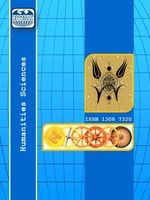NEWS READING HABITS OF SOCIAL MEDIA USERS: COMMENTS, SHARES AND LIKES
News reading habits of readers vary with the arrival of the new media. Readers can like, comment and share so readily what they what. Sensational headlines, interesting ve current issues can draw more attention and get more feedbacks. Internet mediated and virtual communication can lead to comfortable and irresponsible behaviors that are seen less face to face. Internet platforms and news site pages sometimes can turn into lynch and hate situation. Desire to express oneself and momentary reaction greatly is seen in comments and sharings. Comments, sharings and likes find out that readers react what kind of news and topics. In this study, haberturk.com.tr that is Turkish news web site is examined in terms of what kind of news topics that readers comment, share and like in a specific date. Research results indicate that what kind of news are more or less responsive in terms of readers.
Anahtar Kelimeler:
Social Media, News Sites, Social Media News, User Behaviours, Digital Media
___
- 1. Ha, L., Xu, Y., Yang, C., Wang, F., Yang, L., Abuljadail, M., Hu, X., Jiang, W., and Gabay, I., (2016). Decline in News Content Engagement or News Medium Engagement? A Longitudinal Analysis of News Engagement Since The Rise of Social and Mobile Media 2009–2012. Journalism, 1-22. DOI: 10.1177/1464884916667654.
- 2. Östgaard, E., (1965). Factors Influencing the Flow of News. Journal of Peace Research. 2(1):39-63.
- 3. van Dijck, J., (2009). Users Like You? Theorizing Agency in User-Generated Content. Media, Culture & Society, Vol:31(1), 41–58. DOI: 10.1177/0163443708098245.
- 4. Kormelink, T.G., and Meijer, I.C., (2017). What Clicks Actually Mean: Exploring Digital News User Practices. Journalism, 1-16. DOI: 10.1177/1464884916688290.
- 5. Thurman, N., (2008). Forums for Citizen Journalists? Adoption of User Generated Content Initiatives by Online News Media. New media & Society, 10(1):139–157. DOI: 10.1177/1461444807085325.
- 6. Franklin, B., Hamer, M., Hanna, M., Kinsey, M., and Richardson, J.E., (2005). Key Concepts in Journalism Studies. London: SAGE Publications.
- 7. Plasser, F., (2005). From Hard to Soft News Standards? How Political Journalists in Different Media Systems Evaluate the Shifting Quality of News. Harvard International Journal of Press/Politics, 10(2):47-68. Doi: 10.1177/1081180X05277746.
- 8. Katz, E., Blumler, J.G., and Gurevitch, M., (1973). Uses and Gratifications Research. The Public Opinion Quarterly, 37(4):509-523.
- 9. Lasswell, H.D., (1948). The Structure and Function of Communications in Society. In the Communication of Ideas: A Series of Addresses. Ed. Bryson, L., New York: Harper.
- 10. Wright, C.R., (1960). Functional Analysis and Mass Communication. Public Opinion Quarterly, 24(4):605-620.
- 11. McQuail, D., Blumler, J.G. and Brown, J.R., (1972). The Television Audience: A Revised Perspective. In Sociology of Mass Communications, ed. McQuail D., Harmondsworth, Penguin.
- 12. Wasko, M.M. and Faraj, S., (2000). It Is What One Does: Why People Participate And Help Others in Electronic Communities of Practice, The Journal of Strategic Information Systems, 9(2):155-173. Doi.org/10.1016/S0963-8687(00)00045-7.
- Başlangıç: 2009
- Yayıncı: E-Journal of New World Sciences Academy
